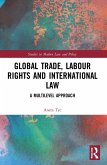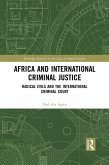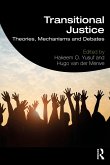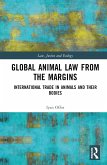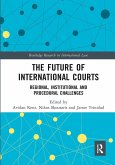- Broschiertes Buch
- Merkliste
- Auf die Merkliste
- Bewerten Bewerten
- Teilen
- Produkt teilen
- Produkterinnerung
- Produkterinnerung
This book offers a stimulating introduction to the links between areas of global governance, human rights global economy and international law. By drawing on a range of diverse subject areas, it argues that the foundations of global governance, human rights and international law are undermined by a conflict or 'tragic flaw', where insistence on absolute conceptions of state sovereignty are pitted against universally accepted principles of justice and human rights resulting in destructive self-interest for both the state and the global community. Following the election of President Donald Trump…mehr
Andere Kunden interessierten sich auch für
![Incitement in International Law Incitement in International Law]() Wibke K. TimmermannIncitement in International Law51,99 €
Wibke K. TimmermannIncitement in International Law51,99 €![Global Trade, Labour Rights and International Law Global Trade, Labour Rights and International Law]() Aneta TycGlobal Trade, Labour Rights and International Law40,99 €
Aneta TycGlobal Trade, Labour Rights and International Law40,99 €![Africa and International Criminal Justice Africa and International Criminal Justice]() Fred AgwuAfrica and International Criminal Justice42,99 €
Fred AgwuAfrica and International Criminal Justice42,99 €![Transitional Justice Transitional Justice]() Transitional Justice36,99 €
Transitional Justice36,99 €![Global Animal Law from the Margins Global Animal Law from the Margins]() Iyan OfforGlobal Animal Law from the Margins152,99 €
Iyan OfforGlobal Animal Law from the Margins152,99 €![The Future of International Courts The Future of International Courts]() The Future of International Courts44,99 €
The Future of International Courts44,99 €![International Organizations and the Idea of Autonomy International Organizations and the Idea of Autonomy]() Richard Collins / Nigel D. White (Hrsg.)International Organizations and the Idea of Autonomy158,99 €
Richard Collins / Nigel D. White (Hrsg.)International Organizations and the Idea of Autonomy158,99 €-
-
-
This book offers a stimulating introduction to the links between areas of global governance, human rights global economy and international law. By drawing on a range of diverse subject areas, it argues that the foundations of global governance, human rights and international law are undermined by a conflict or 'tragic flaw', where insistence on absolute conceptions of state sovereignty are pitted against universally accepted principles of justice and human rights resulting in destructive self-interest for both the state and the global community. Following the election of President Donald Trump , the second edition will explores how we are witnessing a critical battle to ensure that human rights, international law and the beneficial aspects of globalization will still be relevant and applied in some of the critical institutions of global governance and in the operations of the global private sector. The second edition will focus on how States, institutions and global civil society will have to ramp up the struggle to fight this 'tragic flaw' that is now even more evident with the actions of the US and other authoritarian states, like China and Russia in this second decade of the 21st Century.
Produktdetails
- Produktdetails
- Routledge Research in International Law
- Verlag: Routledge / Taylor & Francis
- 2. Aufl.
- Seitenzahl: 304
- Erscheinungstermin: 27. Mai 2024
- Englisch
- Abmessung: 234mm x 156mm x 16mm
- Gewicht: 560g
- ISBN-13: 9781032287584
- ISBN-10: 1032287586
- Artikelnr.: 70366589
- Herstellerkennzeichnung
- Libri GmbH
- Europaallee 1
- 36244 Bad Hersfeld
- gpsr@libri.de
- Routledge Research in International Law
- Verlag: Routledge / Taylor & Francis
- 2. Aufl.
- Seitenzahl: 304
- Erscheinungstermin: 27. Mai 2024
- Englisch
- Abmessung: 234mm x 156mm x 16mm
- Gewicht: 560g
- ISBN-13: 9781032287584
- ISBN-10: 1032287586
- Artikelnr.: 70366589
- Herstellerkennzeichnung
- Libri GmbH
- Europaallee 1
- 36244 Bad Hersfeld
- gpsr@libri.de
Errol P. Mendes is a lawyer, author, professor, and has been an advisor to governments, corporations, civil society groups, and the United Nations in the areas of international law human rights, and global governance. He is the author and/or editor of eleven books dealing with the subjects as diverse as global governance, international human rights, labour standards, the International Criminal Court, and the Canadian Charter of Rights and Freedoms. He has also served as a Visiting Professional at the International Criminal Court in 2009. He was appointed as a Visiting Fellow at Harvard Law School in 2013 and a Visiting Scholar at Oxford University in 2021. He is a full professor of law at the University of Ottawa and President of the International Commission of Jurists, Canada.
CHAPTER 1
- Combating the tragic flaw in the UN
- The contested history of sovereignty and the promise of the Atlantic Charter
- Birth of the United Nations: One step forward, two steps back
- The evolution of the International Bill of Rights: rekindling the age of hope
- U.N. legal standard-setting in human rights: more law, but less moral force
- Genocide, the Cold War and complicity: the age of hypocrisy
- The regional human rights regime in Europe: is the wait for justice over for Europe and
- The regional human rights system in the Americas
- Human rights regional mechanisms in the Asia-Pacific regions
- The African human rights system
- After the Cold War: the era of television wars, genocides and virtual guilt
- The Kosovo crisis, universal jurisdiction and the International Criminal Court:
- Universal jurisdiction; a success or failure in reducing the hold of the tragic flaw?
- The International Criminal Court; sovereign powers uniting in the fight against
- The responsibility to protect and the protection of civilians; the new normative
- Conclusion: A Hegelian dialectic on the road to global justice and human right?
- The "war on terror" and a re-invigorated tragic flaw
- Seeking justice in global trade and economy
- Corporate power and human rights
- The transformation of global economic power: in search of power with
is it a model for the rest of the world?
turning points in the hold of the tragic flaw?
impunity for the most serious international crimes.
core of sovereignty as the legitimate exercise of power?
2.1 The evolution of the world trade regime; another area of global governance, another
tragic flaw.
2.2 Who and what killed the Doha Development Round?
2.3 The global trade regime; can it assist in promoting human rights and justice for the
global labour force?
2.3.1 Debating the duty to promote justice and fairness for the global labour force
between the WTO and the ILO
2.3.2 The ILO attempts to strengthen justice and fairness for the global labour force
2.3.3 Searching for the original vision of justice and human rights for global labour in
the ITO; Can labour standards provisions in bilateral free trade agreements play
a part?
2.4 In the long term do we survive? Trading off the environment.
2.5. Conclusion: solving the democratic deficit: a critical part of the long term
solution
2.6 The evolution and failures of the global financial system: a growing tragic flaw that
undermines fundamental principles of justice and human rights
2.6.1 The Bretton Woods System: the global financial system counterpart of the
Atlantic Charter
2.6.2 The financial tragic flaw undermines the Bretton Woods vision
2.6.3 The tragic flaws in the Bretton Woods system triggers recurrent global financial
crises and the urgent reforms to combat the tragic flaws
2.7. Conclusion: massive winners that thrive on the tragic flaws drive massive inequality
and instability in the global trade and financial systems
responsibility.
3.2 Case studies where corporate power is exercised without responsibility
3.2.1 Corruption
3.2.2 The health and safety of local communities: Bophal almost half a century later as a case
study.
3.2.3 The environmental impact of corporate activities: The failed $9.5 billion claim for damages
against Texaco/Chevron for environmental damage in Ecuador
3.2.4 The human rights impact of global private sector activities; a case study of Shell in Nigeria
3.3 The abuse of corporate Power: a direct or indirect role for
international law?
3.4 Moving from the absence of hard law to soft law: the Ruggie Framework
3.4.1 The state's duty to protect
3.4.2 The corporate responsibility to respect
3.4.3 Access to an effective remedy
3.5 Human rights and corporate social responsibility in the global economy
3.5.1 Corporate codes
3.5.2 Sectorial and industry-wide initiatives (involving coalitions from civil society, states and the
private sector)
3.5.3 Multi-stakeholder transnational Initiatives
3.5.4 Global guidelines, standards and initiatives for corporate social responsibilities
3.5.5 Initiatives by multilateral organizations
3.6 The international legal duties of corporate officials and the global MNEs.
3.7. Conclusion; The MNE as the main beneficiary of globalization and global governance: why
the gap between power and responsibility must be bridged
4. The foundations of global pluralism as the next stage of global governance
CHAPTER 1
1. Combating the tragic flaw in the UN
1. The contested history of sovereignty and the promise of the Atlantic
Charter
2. Birth of the United Nations: One step forward, two steps back
3. The evolution of the International Bill of Rights: rekindling the age
of hope
4. U.N. legal standard-setting in human rights: more law, but less moral
force
5. Genocide, the Cold War and complicity: the age of hypocrisy
6. The regional human rights regime in Europe: is the wait for justice
over for Europe and
is it a model for the rest of the world?
7. The regional human rights system in the Americas
8. Human rights regional mechanisms in the Asia-Pacific regions
9. The African human rights system
10. After the Cold War: the era of television wars, genocides and virtual
guilt
11. The Kosovo crisis, universal jurisdiction and the International
Criminal Court:
turning points in the hold of the tragic flaw?
12. Universal jurisdiction; a success or failure in reducing the hold of
the tragic flaw?
13. The International Criminal Court; sovereign powers uniting in the
fight against
impunity for the most serious international crimes.
14. The responsibility to protect and the protection of civilians; the
new normative
core of sovereignty as the legitimate exercise of power?
15. Conclusion: A Hegelian dialectic on the road to global justice and
human right?
16. The "war on terror" and a re-invigorated tragic flaw
2. Seeking justice in global trade and economy
2.1 The evolution of the world trade regime; another area of global
governance, another
tragic flaw.
2.2 Who and what killed the Doha Development Round?
2.3 The global trade regime; can it assist in promoting human rights and
justice for the
global labour force?
2.3.1 Debating the duty to promote justice and fairness for the global
labour force
between the WTO and the ILO
2.3.2 The ILO attempts to strengthen justice and fairness for the global
labour force
2.3.3 Searching for the original vision of justice and human rights for
global labour in
the ITO; Can labour standards provisions in bilateral free trade agreements
play
a part?
2.4 In the long term do we survive? Trading off the environment.
2.5. Conclusion: solving the democratic deficit: a critical part of the
long term
solution
2.6 The evolution and failures of the global financial system: a growing
tragic flaw that
undermines fundamental principles of justice and human rights
2.6.1 The Bretton Woods System: the global financial system counterpart of
the
Atlantic Charter
2.6.2 The financial tragic flaw undermines the Bretton Woods vision
2.6.3 The tragic flaws in the Bretton Woods system triggers recurrent
global financial
crises and the urgent reforms to combat the tragic flaws
2.7. Conclusion: massive winners that thrive on the tragic flaws drive
massive inequality
and instability in the global trade and financial systems
3. Corporate power and human rights
1. The transformation of global economic power: in search of power with
responsibility.
3.2 Case studies where corporate power is exercised without responsibility
3.2.1 Corruption
3.2.2 The health and safety of local communities: Bophal almost half a
century later as a case
study.
3.2.3 The environmental impact of corporate activities: The failed $9.5
billion claim for damages
against Texaco/Chevron for environmental damage in Ecuador
3.2.4 The human rights impact of global private sector activities; a case
study of Shell in Nigeria
3.3 The abuse of corporate Power: a direct or indirect role for
international law?
3.4 Moving from the absence of hard law to soft law: the Ruggie Framework
3.4.1 The state's duty to protect
3.4.2 The corporate responsibility to respect
3.4.3 Access to an effective remedy
3.5 Human rights and corporate social responsibility in the global economy
3.5.1 Corporate codes
3.5.2 Sectorial and industry-wide initiatives (involving coalitions from
civil society, states and the
private sector)
3.5.3 Multi-stakeholder transnational Initiatives
3.5.4 Global guidelines, standards and initiatives for corporate social
responsibilities
3.5.5 Initiatives by multilateral organizations
3.6 The international legal duties of corporate officials and the global
MNEs.
3.7. Conclusion; The MNE as the main beneficiary of globalization and
global governance: why
the gap between power and responsibility must be bridged
4. The foundations of global pluralism as the next stage of global
governance
1. Combating the tragic flaw in the UN
1. The contested history of sovereignty and the promise of the Atlantic
Charter
2. Birth of the United Nations: One step forward, two steps back
3. The evolution of the International Bill of Rights: rekindling the age
of hope
4. U.N. legal standard-setting in human rights: more law, but less moral
force
5. Genocide, the Cold War and complicity: the age of hypocrisy
6. The regional human rights regime in Europe: is the wait for justice
over for Europe and
is it a model for the rest of the world?
7. The regional human rights system in the Americas
8. Human rights regional mechanisms in the Asia-Pacific regions
9. The African human rights system
10. After the Cold War: the era of television wars, genocides and virtual
guilt
11. The Kosovo crisis, universal jurisdiction and the International
Criminal Court:
turning points in the hold of the tragic flaw?
12. Universal jurisdiction; a success or failure in reducing the hold of
the tragic flaw?
13. The International Criminal Court; sovereign powers uniting in the
fight against
impunity for the most serious international crimes.
14. The responsibility to protect and the protection of civilians; the
new normative
core of sovereignty as the legitimate exercise of power?
15. Conclusion: A Hegelian dialectic on the road to global justice and
human right?
16. The "war on terror" and a re-invigorated tragic flaw
2. Seeking justice in global trade and economy
2.1 The evolution of the world trade regime; another area of global
governance, another
tragic flaw.
2.2 Who and what killed the Doha Development Round?
2.3 The global trade regime; can it assist in promoting human rights and
justice for the
global labour force?
2.3.1 Debating the duty to promote justice and fairness for the global
labour force
between the WTO and the ILO
2.3.2 The ILO attempts to strengthen justice and fairness for the global
labour force
2.3.3 Searching for the original vision of justice and human rights for
global labour in
the ITO; Can labour standards provisions in bilateral free trade agreements
play
a part?
2.4 In the long term do we survive? Trading off the environment.
2.5. Conclusion: solving the democratic deficit: a critical part of the
long term
solution
2.6 The evolution and failures of the global financial system: a growing
tragic flaw that
undermines fundamental principles of justice and human rights
2.6.1 The Bretton Woods System: the global financial system counterpart of
the
Atlantic Charter
2.6.2 The financial tragic flaw undermines the Bretton Woods vision
2.6.3 The tragic flaws in the Bretton Woods system triggers recurrent
global financial
crises and the urgent reforms to combat the tragic flaws
2.7. Conclusion: massive winners that thrive on the tragic flaws drive
massive inequality
and instability in the global trade and financial systems
3. Corporate power and human rights
1. The transformation of global economic power: in search of power with
responsibility.
3.2 Case studies where corporate power is exercised without responsibility
3.2.1 Corruption
3.2.2 The health and safety of local communities: Bophal almost half a
century later as a case
study.
3.2.3 The environmental impact of corporate activities: The failed $9.5
billion claim for damages
against Texaco/Chevron for environmental damage in Ecuador
3.2.4 The human rights impact of global private sector activities; a case
study of Shell in Nigeria
3.3 The abuse of corporate Power: a direct or indirect role for
international law?
3.4 Moving from the absence of hard law to soft law: the Ruggie Framework
3.4.1 The state's duty to protect
3.4.2 The corporate responsibility to respect
3.4.3 Access to an effective remedy
3.5 Human rights and corporate social responsibility in the global economy
3.5.1 Corporate codes
3.5.2 Sectorial and industry-wide initiatives (involving coalitions from
civil society, states and the
private sector)
3.5.3 Multi-stakeholder transnational Initiatives
3.5.4 Global guidelines, standards and initiatives for corporate social
responsibilities
3.5.5 Initiatives by multilateral organizations
3.6 The international legal duties of corporate officials and the global
MNEs.
3.7. Conclusion; The MNE as the main beneficiary of globalization and
global governance: why
the gap between power and responsibility must be bridged
4. The foundations of global pluralism as the next stage of global
governance
CHAPTER 1
- Combating the tragic flaw in the UN
- The contested history of sovereignty and the promise of the Atlantic Charter
- Birth of the United Nations: One step forward, two steps back
- The evolution of the International Bill of Rights: rekindling the age of hope
- U.N. legal standard-setting in human rights: more law, but less moral force
- Genocide, the Cold War and complicity: the age of hypocrisy
- The regional human rights regime in Europe: is the wait for justice over for Europe and
- The regional human rights system in the Americas
- Human rights regional mechanisms in the Asia-Pacific regions
- The African human rights system
- After the Cold War: the era of television wars, genocides and virtual guilt
- The Kosovo crisis, universal jurisdiction and the International Criminal Court:
- Universal jurisdiction; a success or failure in reducing the hold of the tragic flaw?
- The International Criminal Court; sovereign powers uniting in the fight against
- The responsibility to protect and the protection of civilians; the new normative
- Conclusion: A Hegelian dialectic on the road to global justice and human right?
- The "war on terror" and a re-invigorated tragic flaw
- Seeking justice in global trade and economy
- Corporate power and human rights
- The transformation of global economic power: in search of power with
is it a model for the rest of the world?
turning points in the hold of the tragic flaw?
impunity for the most serious international crimes.
core of sovereignty as the legitimate exercise of power?
2.1 The evolution of the world trade regime; another area of global governance, another
tragic flaw.
2.2 Who and what killed the Doha Development Round?
2.3 The global trade regime; can it assist in promoting human rights and justice for the
global labour force?
2.3.1 Debating the duty to promote justice and fairness for the global labour force
between the WTO and the ILO
2.3.2 The ILO attempts to strengthen justice and fairness for the global labour force
2.3.3 Searching for the original vision of justice and human rights for global labour in
the ITO; Can labour standards provisions in bilateral free trade agreements play
a part?
2.4 In the long term do we survive? Trading off the environment.
2.5. Conclusion: solving the democratic deficit: a critical part of the long term
solution
2.6 The evolution and failures of the global financial system: a growing tragic flaw that
undermines fundamental principles of justice and human rights
2.6.1 The Bretton Woods System: the global financial system counterpart of the
Atlantic Charter
2.6.2 The financial tragic flaw undermines the Bretton Woods vision
2.6.3 The tragic flaws in the Bretton Woods system triggers recurrent global financial
crises and the urgent reforms to combat the tragic flaws
2.7. Conclusion: massive winners that thrive on the tragic flaws drive massive inequality
and instability in the global trade and financial systems
responsibility.
3.2 Case studies where corporate power is exercised without responsibility
3.2.1 Corruption
3.2.2 The health and safety of local communities: Bophal almost half a century later as a case
study.
3.2.3 The environmental impact of corporate activities: The failed $9.5 billion claim for damages
against Texaco/Chevron for environmental damage in Ecuador
3.2.4 The human rights impact of global private sector activities; a case study of Shell in Nigeria
3.3 The abuse of corporate Power: a direct or indirect role for
international law?
3.4 Moving from the absence of hard law to soft law: the Ruggie Framework
3.4.1 The state's duty to protect
3.4.2 The corporate responsibility to respect
3.4.3 Access to an effective remedy
3.5 Human rights and corporate social responsibility in the global economy
3.5.1 Corporate codes
3.5.2 Sectorial and industry-wide initiatives (involving coalitions from civil society, states and the
private sector)
3.5.3 Multi-stakeholder transnational Initiatives
3.5.4 Global guidelines, standards and initiatives for corporate social responsibilities
3.5.5 Initiatives by multilateral organizations
3.6 The international legal duties of corporate officials and the global MNEs.
3.7. Conclusion; The MNE as the main beneficiary of globalization and global governance: why
the gap between power and responsibility must be bridged
4. The foundations of global pluralism as the next stage of global governance
CHAPTER 1
1. Combating the tragic flaw in the UN
1. The contested history of sovereignty and the promise of the Atlantic
Charter
2. Birth of the United Nations: One step forward, two steps back
3. The evolution of the International Bill of Rights: rekindling the age
of hope
4. U.N. legal standard-setting in human rights: more law, but less moral
force
5. Genocide, the Cold War and complicity: the age of hypocrisy
6. The regional human rights regime in Europe: is the wait for justice
over for Europe and
is it a model for the rest of the world?
7. The regional human rights system in the Americas
8. Human rights regional mechanisms in the Asia-Pacific regions
9. The African human rights system
10. After the Cold War: the era of television wars, genocides and virtual
guilt
11. The Kosovo crisis, universal jurisdiction and the International
Criminal Court:
turning points in the hold of the tragic flaw?
12. Universal jurisdiction; a success or failure in reducing the hold of
the tragic flaw?
13. The International Criminal Court; sovereign powers uniting in the
fight against
impunity for the most serious international crimes.
14. The responsibility to protect and the protection of civilians; the
new normative
core of sovereignty as the legitimate exercise of power?
15. Conclusion: A Hegelian dialectic on the road to global justice and
human right?
16. The "war on terror" and a re-invigorated tragic flaw
2. Seeking justice in global trade and economy
2.1 The evolution of the world trade regime; another area of global
governance, another
tragic flaw.
2.2 Who and what killed the Doha Development Round?
2.3 The global trade regime; can it assist in promoting human rights and
justice for the
global labour force?
2.3.1 Debating the duty to promote justice and fairness for the global
labour force
between the WTO and the ILO
2.3.2 The ILO attempts to strengthen justice and fairness for the global
labour force
2.3.3 Searching for the original vision of justice and human rights for
global labour in
the ITO; Can labour standards provisions in bilateral free trade agreements
play
a part?
2.4 In the long term do we survive? Trading off the environment.
2.5. Conclusion: solving the democratic deficit: a critical part of the
long term
solution
2.6 The evolution and failures of the global financial system: a growing
tragic flaw that
undermines fundamental principles of justice and human rights
2.6.1 The Bretton Woods System: the global financial system counterpart of
the
Atlantic Charter
2.6.2 The financial tragic flaw undermines the Bretton Woods vision
2.6.3 The tragic flaws in the Bretton Woods system triggers recurrent
global financial
crises and the urgent reforms to combat the tragic flaws
2.7. Conclusion: massive winners that thrive on the tragic flaws drive
massive inequality
and instability in the global trade and financial systems
3. Corporate power and human rights
1. The transformation of global economic power: in search of power with
responsibility.
3.2 Case studies where corporate power is exercised without responsibility
3.2.1 Corruption
3.2.2 The health and safety of local communities: Bophal almost half a
century later as a case
study.
3.2.3 The environmental impact of corporate activities: The failed $9.5
billion claim for damages
against Texaco/Chevron for environmental damage in Ecuador
3.2.4 The human rights impact of global private sector activities; a case
study of Shell in Nigeria
3.3 The abuse of corporate Power: a direct or indirect role for
international law?
3.4 Moving from the absence of hard law to soft law: the Ruggie Framework
3.4.1 The state's duty to protect
3.4.2 The corporate responsibility to respect
3.4.3 Access to an effective remedy
3.5 Human rights and corporate social responsibility in the global economy
3.5.1 Corporate codes
3.5.2 Sectorial and industry-wide initiatives (involving coalitions from
civil society, states and the
private sector)
3.5.3 Multi-stakeholder transnational Initiatives
3.5.4 Global guidelines, standards and initiatives for corporate social
responsibilities
3.5.5 Initiatives by multilateral organizations
3.6 The international legal duties of corporate officials and the global
MNEs.
3.7. Conclusion; The MNE as the main beneficiary of globalization and
global governance: why
the gap between power and responsibility must be bridged
4. The foundations of global pluralism as the next stage of global
governance
1. Combating the tragic flaw in the UN
1. The contested history of sovereignty and the promise of the Atlantic
Charter
2. Birth of the United Nations: One step forward, two steps back
3. The evolution of the International Bill of Rights: rekindling the age
of hope
4. U.N. legal standard-setting in human rights: more law, but less moral
force
5. Genocide, the Cold War and complicity: the age of hypocrisy
6. The regional human rights regime in Europe: is the wait for justice
over for Europe and
is it a model for the rest of the world?
7. The regional human rights system in the Americas
8. Human rights regional mechanisms in the Asia-Pacific regions
9. The African human rights system
10. After the Cold War: the era of television wars, genocides and virtual
guilt
11. The Kosovo crisis, universal jurisdiction and the International
Criminal Court:
turning points in the hold of the tragic flaw?
12. Universal jurisdiction; a success or failure in reducing the hold of
the tragic flaw?
13. The International Criminal Court; sovereign powers uniting in the
fight against
impunity for the most serious international crimes.
14. The responsibility to protect and the protection of civilians; the
new normative
core of sovereignty as the legitimate exercise of power?
15. Conclusion: A Hegelian dialectic on the road to global justice and
human right?
16. The "war on terror" and a re-invigorated tragic flaw
2. Seeking justice in global trade and economy
2.1 The evolution of the world trade regime; another area of global
governance, another
tragic flaw.
2.2 Who and what killed the Doha Development Round?
2.3 The global trade regime; can it assist in promoting human rights and
justice for the
global labour force?
2.3.1 Debating the duty to promote justice and fairness for the global
labour force
between the WTO and the ILO
2.3.2 The ILO attempts to strengthen justice and fairness for the global
labour force
2.3.3 Searching for the original vision of justice and human rights for
global labour in
the ITO; Can labour standards provisions in bilateral free trade agreements
play
a part?
2.4 In the long term do we survive? Trading off the environment.
2.5. Conclusion: solving the democratic deficit: a critical part of the
long term
solution
2.6 The evolution and failures of the global financial system: a growing
tragic flaw that
undermines fundamental principles of justice and human rights
2.6.1 The Bretton Woods System: the global financial system counterpart of
the
Atlantic Charter
2.6.2 The financial tragic flaw undermines the Bretton Woods vision
2.6.3 The tragic flaws in the Bretton Woods system triggers recurrent
global financial
crises and the urgent reforms to combat the tragic flaws
2.7. Conclusion: massive winners that thrive on the tragic flaws drive
massive inequality
and instability in the global trade and financial systems
3. Corporate power and human rights
1. The transformation of global economic power: in search of power with
responsibility.
3.2 Case studies where corporate power is exercised without responsibility
3.2.1 Corruption
3.2.2 The health and safety of local communities: Bophal almost half a
century later as a case
study.
3.2.3 The environmental impact of corporate activities: The failed $9.5
billion claim for damages
against Texaco/Chevron for environmental damage in Ecuador
3.2.4 The human rights impact of global private sector activities; a case
study of Shell in Nigeria
3.3 The abuse of corporate Power: a direct or indirect role for
international law?
3.4 Moving from the absence of hard law to soft law: the Ruggie Framework
3.4.1 The state's duty to protect
3.4.2 The corporate responsibility to respect
3.4.3 Access to an effective remedy
3.5 Human rights and corporate social responsibility in the global economy
3.5.1 Corporate codes
3.5.2 Sectorial and industry-wide initiatives (involving coalitions from
civil society, states and the
private sector)
3.5.3 Multi-stakeholder transnational Initiatives
3.5.4 Global guidelines, standards and initiatives for corporate social
responsibilities
3.5.5 Initiatives by multilateral organizations
3.6 The international legal duties of corporate officials and the global
MNEs.
3.7. Conclusion; The MNE as the main beneficiary of globalization and
global governance: why
the gap between power and responsibility must be bridged
4. The foundations of global pluralism as the next stage of global
governance



